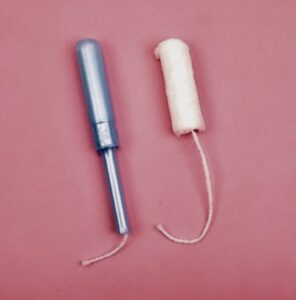Have you noticed a changing period? Many women's cycles experience subtle change. But if you notice a sudden change in menstrual cycle length, or flow volume, that's something to discuss with your doctor.

Now, during the COVID pandemic, plenty of women experienced temporary changes to their cycles. Some got their period more frequently, or even skipped a period. Others noticed a heavier period, or one that get stretched out with days of breakthrough bleeding, making it seem like you had two periods in a month.
At the time, the collective experience of changing periods was commonplace. And that was because, as Dr. Beth Donaldson told the Huffington Post, “Stress hormones can react with the regular hormonal cycle and misguide the body.”
In other words, if you're going through a tough time, your wonky period symptoms could be a sign to slow down and manage that stress. But if those changes have persisted for more than a few months, it's worth exploring other potential causes of period changes that affect your monthly cycle.
Fibroids can be responsible for your changing periods: from your cycle length to the heaviness of your flow, these non-cancerous tumors can take a major toll on your body each month. But fibroids aren't the only things that affect your monthly cycle: getting older leads to menstrual changes, too. For this reason, it's important to know what changes are typical for your age, and which are not. Recognizing the difference between typical and atypical cycle changes could help you come to a fibroid diagnosis that much quicker. In fact, there's been a recent spike in fibroid diagnoses among women in their 30s. Yet that's a time in life when your periods could start changing anyways.

With that in mind, here's a decade-by-decade guide to what you should expect from your menstrual cycle. Knowing what to expect could help you notice, and speak up about, any abnormal period changes.
Even irregular periods usually become consistent in this decade. Unfortunately, symptoms like cramps, PMS and breast tenderness also become more regular, although birth control can help mitigate menstrual symptoms. Keep in mind, however, that if you already have fibroids, birth control may contribute to their growth, so you should always consult with your doctor before starting on an oral contraceptive.
This decade is the one in which most women are diagnosed with fibroids, so take note of any major changes in your cycle at this time. Want some good news? Many women will have already had children by this stage of life; after a pregnancy, negative menstrual symptoms often dissipate or go away entirely! If you receive a fibroid diagnosis in your 30s, and still plan to expand your family, it's important to discuss treatment options with a fibroid specialist. There are several fertility-sparing fibroid treatments that can provide symptom relief without forcing you to have a hysterectomy.
This is the decade in which your period will likely become irregular, as you typically enter perimenopause. It can also become heavier (an effect that can also be caused by fibroids or, more worryingly, endometrial cancer, according to this study.) In this decade of life, spotting between periods is also not uncommon. Don't forget that pregnancy is still a possibility at this stage, so you have to carefully consider alternative contraception options before ceasing oral contraceptives that may have previously helped you manage fibroid symptoms like heavy flow.
Certain other problems can also trigger changes in the length of your cycle or the heaviness of your flow. In addition to fibroids, changes in your uterine structure, such as polyps or endometriosis, could also change your period. When conditions like PCOS or thyroid problems affect your hormone levels, your period could also change. The same is true if you're under lots of stress (see our earlier note about the pandemic.) Or if you go on an extreme diet, over-exercise or suffer from a condition such as anorexia or bulimia. Finally, abnormal bleeding (especially bleeding after menopause) could be a symptom of certain gynecologic cancers. So if changes in your period occur after your period has stopped, that should be a sign to see your doctor immediately!
Now, keep in mind: while we can make general assumptions about the way your period will progress over the years, every woman is different. What's "normal" for one person may be unbearable to another. So, how can you tell when it's time to see a doctor about a changing period? Here's our rule of thumb: if your menstrual symptoms are significant enough to negatively impact your day, it's a good idea to inform your doctor of what's going on! And if you suspect that fibroids are behind the changes in your cycle, come see our Houston fibroid specialists right away so you can learn your fibroid treatment options! All you have to do is click here to request an appointment!
Sources: Health Central, Huffpost.com, Edward-Elmhurst Health

Scheduling
Please contact our dedicated specialists to schedule a consultation today.
2024 Houston Fibroids. All rights reserved. Website Design by Healthcare Success